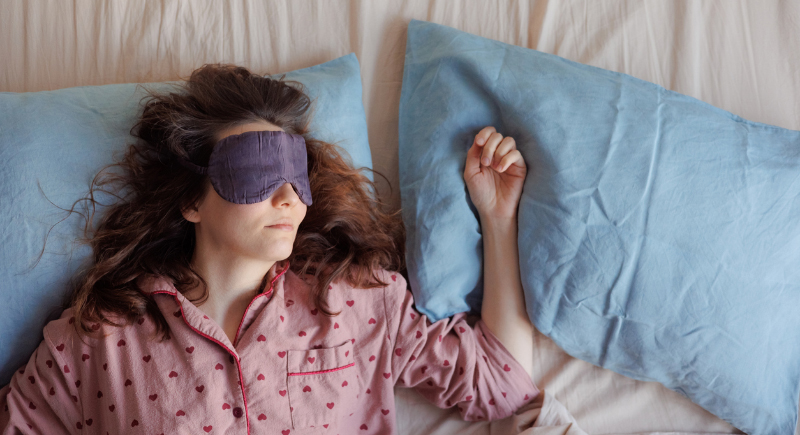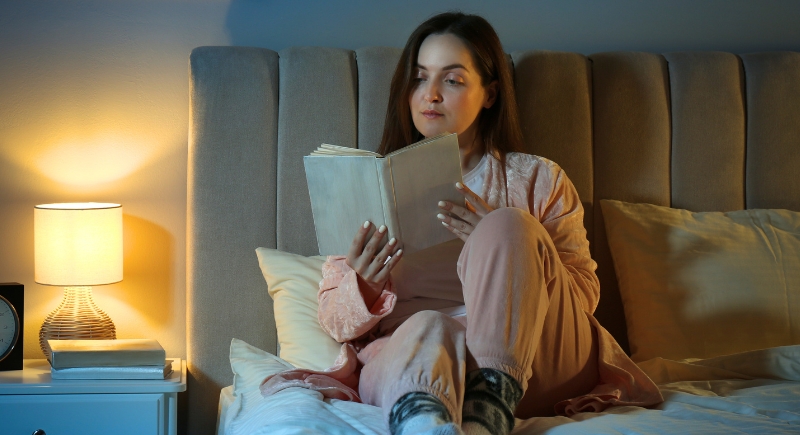Why ‘Sleepmaxxing’ Is Becoming the Latest Health and Wellness Trend
You’ve heard about gymmaxxing, right? And glowmaxxing? Maybe you’ve even heard of rizzmaxxing. No kidding, that’s a real thing. For a while now, it seems like everyone is trying to optimize some part of their life for the ultimate upgrade. The latest thing people are “maxxing” for is sleep.
If you’re still setting a vague goal to get more rest, you’re definitely behind the times. Sleepmaxxing is a full-blown wellness trend led, quite ironically, by a generation known for being online 24/7. Some people are canceling dinner plans to be home by 9 p.m. Others are ditching their phones, skipping the nightcap, and dropping a surprising amount of cash on things like blackout curtains, diffusers, and smart rings.
Everyone’s suddenly unplugging and making bedtime a priority.
The New ‘Why’: Mental Health

Image via iStockphoto/Olga Serba
The “sleep is for the weak” mantra is no longer a flex. According to a recent Amerisleep survey, nearly half of all Americans are now actively working to improve their sleep. Approximately 48% of Gen Z reported making fundamental changes to get more rest. They’re redesigning their bedrooms, buying sleep tech, and spending actual money to prioritize a healthy lifestyle.
While past generations glorified sleepless nights as a badge of honor for productivity, Gen Z is all about balance. This move is driven by a very real need to deal with rising cases of anxiety, burnout, and depression in young people.
Sleep and mental health are closely linked. Poor sleep can increase the stress hormone cortisol, which makes anxiety and depression symptoms worse. When you get a restful night’s sleep, you can better regulate your emotions, which leads to fewer mood swings and a greater ability to handle daily setbacks. Good sleep also helps with focus and memory.
So, many Americans are now cutting back on late-night activities on their phone or otherwise. Some would even cancel plans completely just to get to bed on time. According to the Amerisleep survey, about 25% of Gen Zers even feel guilty for choosing sleep over a social event. Still, for many, the benefits of waking up mentally sharper and more emotionally balanced are well worth the sacrifice.
Fact vs. Fiction
As with any viral wellness trend, sleepmaxxing involves a wide range of advice, products, and practices. Some are basic and backed by science, while others are more about social media hype.
A thorough search of major scientific databases reveals that “sleepmaxxing” has not been studied as a defined package. This doesn’t mean that the individual ideas don’t work; it means the concept is a marketing term, not a scientific one. Experts caution that the commercialization of sleep is a genuine concern, with some influencers promoting ineffective or risky products.
So, what are the most popular sleepmaxxing ideas, and what does the science say?
Some popular practices lack solid evidence. Mouth taping, a viral but uncomfortable choice, promises to reduce snoring and improve breath. However, a review of research on the practice found that scientific studies don’t back most social media claims.
Another popular item, weighted blankets, has seen intriguing research, but there is no convincing evidence that they are truly effective for the general population. Small studies on things like kiwi fruit helping with sleep should be viewed with a healthy dose of skepticism due to the potential for a placebo effect.
Other popular items get a more mixed review. Melatonin, a commonly suggested supplement, is recommended by sleep experts for treating specific issues like jet lag. However, it’s not a solution for general poor sleep, and over-the-counter supplements often contain dosages higher than what is considered safe.
Sleep trackers can be a great way to monitor your habits and start a conversation with your doctor, but they are not diagnostic tools and should be interpreted carefully. One 2017 case series report published in the Journal of Clinical Sleep Medicine showed that sleep issues could be exacerbated by people’s obsession with sleep tracker data, something called orthosomnia.
The Real Way to “Maxx” Your Sleep

Image via Canva/Africa images
Many of the best sleepmaxxing tips are common-sense habits that have been around for a long time. Sleep experts call them good sleep hygiene. They may not be as exciting as a trendy new gadget, but they are the most effective.
If you’re ready to start your own sleep revolution, here are a few basic, proven steps:
- Establish a consistent sleep schedule. Go to bed and wake up at the same time every day, even on weekends. Your body’s internal clock loves predictability.
- Create a good sleep environment. Your bedroom should be calm, quiet, and dark. Use blackout curtains or a fan to make it a relaxed, comfortable space.
- Limit your stimulants. Avoid caffeine, alcohol, and sugary foods in the evening, as they can keep your mind and body awake.
- Wind down. Make a ritual of going to bed. To reduce exposure to blue light, avoid screens for at least 45 minutes before you want to sleep. Try reading, meditating, or light stretching.